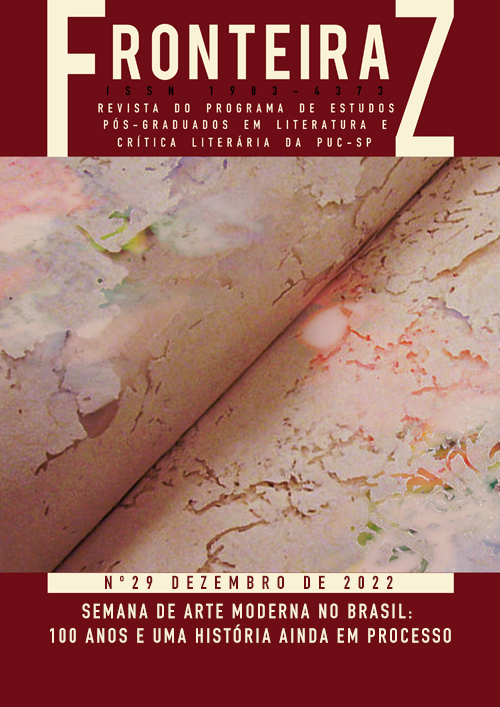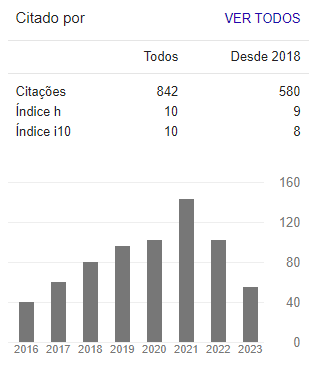The close bond between ogbanje daughters and their fathers in the novels Things Fall Apart and The Bride Price
DOI:
https://doi.org/10.23925/1983-4373.2022i29p143-156Palavras-chave:
Ogbanje, Cultura ibo, Romances nigerianos, Chinua Achebe, Buchi EmechetaResumo
A Nigéria é formada por mais de 200 grupos étnicos, tornando-se a nação mais multiétnica na África Ocidental. Os termos ogbanje/abiku, presentes na cultura dos ibos e dos iorubás, referem-se às crianças destinadas a morrer e que, após a morte, renascem constantemente da mesma mãe. Esse fenômeno cíclico tem sido incorporado nos romances O mundo se despedaça (1958), de Chinua Achebe, e Preço de noiva (1976), de Buchi Emecheta. Ancorado em Achebe (1986) e em outros teóricos, o estudo tem por objetivo analisar o fenômeno ogbanje e comparar esses dois romances, lançando luz sobre a forte ligação que envolve as filhas ogbanjes e seus pais. Como resultado, a pesquisa aponta significativa conexão entre o pai Okonkwo e sua filha, quanto à masculinidade, com foco na negligência às tradições locais. A análise comparativa serve de estudo-piloto para uma investigação mais ampla da cultura no campo dos estudos literários e culturais.
Referências
ACHEBE, C. The African Trilogy: Things Fall Apart; Arrow of God; No Longer at Ease. New York: Penguin Classics, 2017.
ACHEBE, C. The world of the Ogbanje. Enugu: Fourth Dimension Publishers, 1986.
ACHEBE, N. Igbo Goddesses and the Priests and Male Priestesses Who Serve Them. In: FALOLA, T.; NJOKU, R. C. (Ed.). Igbo in the Atlantic world: African origins and diasporic destinations. Bloomington: Indiana University Press, 2016, p. 28-45.
AJI, A.; ELLSWORTH, K. L. Ezinma: The Ogbanje Child in Achebe’s Things Fall Apart. College Literature, v. 19/20, n. 3/1, p. 170-175, 1992. Disponível em: http://www.jstor.org/stable/25111997. Acesso em: 15 maio 2022.
ASAKITIKPI, A. E. Born to Die: The Ogbanje Phenomenon and Its Implication on Childhood Mortality in Southern Nigeria. Anthropologist, v. 10, n. 1, p. 59-63, 2008. Disponível em: https://doi.org/10.1080/09720073.2008.11891030. Acesso em: 20 abr. 2022.
CASTORIADIS, C. Translated by Kathleen Blarney. The Imaginary Institution of Society. Cambridge: Polity, 1987.
COOPER, B. Magical Realism in West African Fiction: Seeing with a third eye. London: Routledge, 1998.
EBHOMIENLEN, T. O. The Concepts of Born to Die Children and the Fate of Victim Mothers in Nigeria. International Journal of Humanities and Cultural Studies, v. 2, n. 1, p. 142-155, June 2015. Disponível em: http://www.ijhcs.com/index.php/ijhcs/article/view/302. Acesso em: 22 abr. 2022.
EDEH, E. M. P. Towards an Igbo Metaphysics. Chicago: Loyola University Press, 1985.
EMECHETA, B. The Bride Price. New York: George Braziller, 2014.
FALOLA, T. The Power of African Cultures. New York: University of Rochester Press, 2003.
FALOLA, T.; HEATON, M. M. A History of Nigeria. New York: Cambridge University Press, 2008.
HARLER, C. A. The Ogbanje in Little Bee by Chris Cleave. 2013. Dissertation (Master of Arts in English Literature) – College of Arts, Humanities & Social Sciences, Eastern Washington University, Cheney, 2013. Disponível em: http://dc.ewu.edu/theses/175. Acesso em: 15 abr. 2022.
ILECHUKWU, S. T. C. Ogbanje/abiku and cultural conceptualizations of psychopathology in Nigeria. Mental Health, Religion & Culture, v. 10, n. 3, p. 239-255, 2007. Disponível em: https://doi.org/10.1080/13694670600621795. Acesso em: 20 abr. 2022.
KATUNDANO, T. Cultural Practices in Africa: Still a Barrier to Girls’ Education in the 21st Century? International Journal of Educational Theory and Practice, v. 3, n. 1/4, p. 1-17, 2020. Disponível em: https://finessejournals.com/index.php/IJETP/article/view/23/20. Acesso em: 10 jul. 2022.
LYNCH, P. A. African mythology A to Z. New York: Chelsea House, 2010.
MBAH, G. A.; UZODIGWE, H. A. Onyohor Community. In: EZIKE, S. (Ed.). History and Tradition of the People of Igbo-Etiti. Ibadan: The Society of Young Nigerian Writers, 2009. p. 209-225.
NWAUBANI, A. T. Nigeria's slave descendants prevented from marrying who they want. BBC News, Nigeria/London, 14 set. 2020. Africa. Disponível em: https://www.bbc.com/news/world-africa-54088880. Acesso em: 01 jul. 2022.
NZEWI, E. Malevolent Ogbanje: recurrent reincarnation or sickle cell disease? Social Science & Medicine, v. 52, n. 9, p. 1403-1416, 2001. Disponível em: https://doi.org/10.1016/S0277-9536(00)00245-8. Acesso em: 22 abr. 2022.
OGUNBOYE, A. O. P.; FULLER, L. L. The human soul in Yoruba/Igbo tradition and the Bible. Africa Journal of Evangelical Theology, v. 19, n. 1, p. 75-86, 2000. Disponível em: https://biblicalstudies.org.uk/pdf/ajet/19-1_075.pdf. Acesso em: 20 abr. 2022.
OKONKWO, C. N. A Critical Divination: Reading Sula as Ogbanje-Abiku. African American Review, v. 38, n. 4, p. 651-668, Winter 2004. Disponível em: https://doi.org/10.2307/4134423. Acesso em: 22 maio 2022.
SENANU, K. E.; VINCENT, T. A Selection of African Poetry. London: Longman, 1988.
SOYINKA, W. Myth, Literature and the African World. Cambridge: Cambridge University Press, 2000.
Downloads
Publicado
Como Citar
Edição
Seção
Licença
Copyright (c) 2022 FronteiraZ. Revista do Programa de Estudos Pós-Graduados em Literatura e Crítica Literária

Este trabalho está licenciado sob uma licença Creative Commons Attribution-NonCommercial 4.0 International License.







 Este obra está licenciada com uma Licença
Este obra está licenciada com uma Licença 